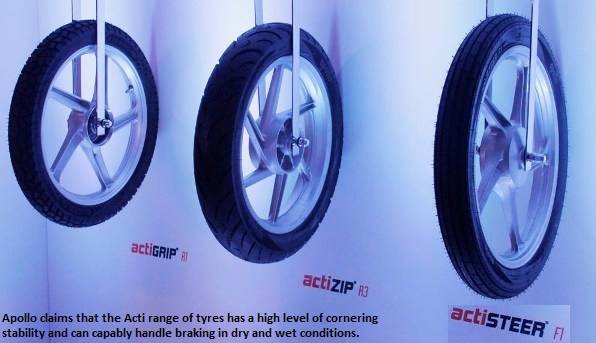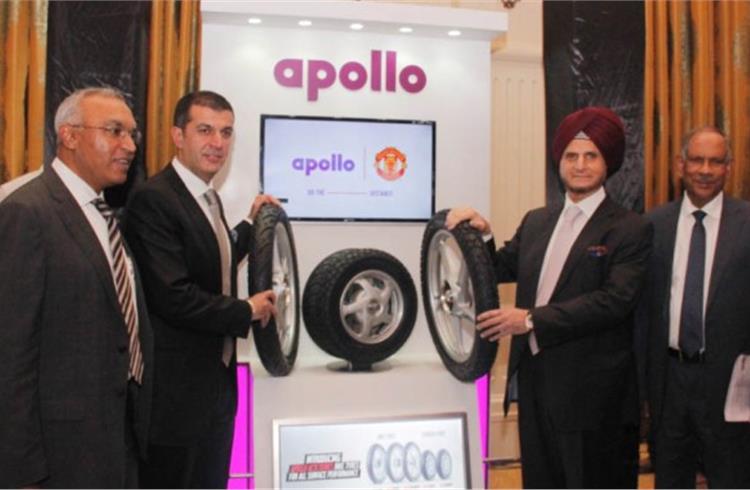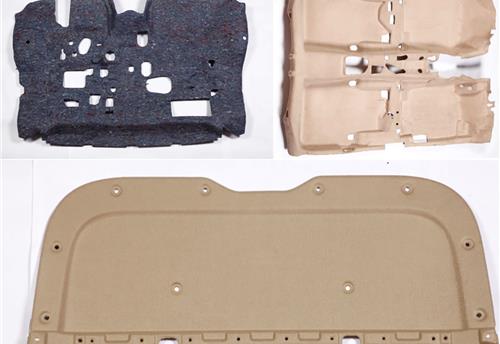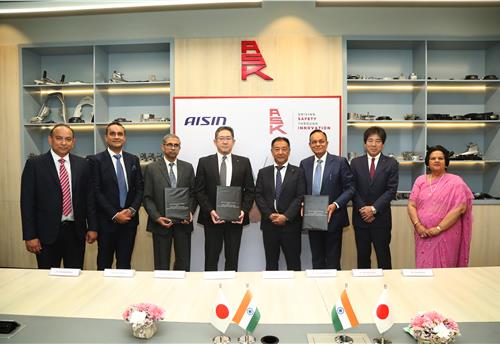Apollo Tyres rides into the two-wheeler tyre market
Apollo Tyres today announced its entry into the two-wheeler tyre segment and unveiled a range of tyres for motorcycles and scooters.
Apollo Tyres today announced its entry into the two-wheeler tyre segment and unveiled its Acti range of tyres for fitment on motorcycles and scooters. Its foray into this vehicle segment has been mainly because it foresees huge potential demand in India as also demand from its business partners to enter the market.
Called Apollo Acti, the range of tyres is designed and developed at the company’s R&D centre in Chennai. The company, which has been manufacturing tyres for passenger vehicles and commercial vehicles, aims to cover nearly 85 percent of the replacement market for two-wheelers in India.
In the first phase, Apollo is launching three patterns for rear application in motorcycles – ActiGrip R1 and R2 in block pattern and ActiZip R3 in directional pattern. In addition, three patterns of front application in motorcycles –ActiSteer F1 in straight rib pattern and ActiZip F2 and F3 in directional patterns and two directional patterns for front and rear application in ActiZip S1 and S2 and two block patterns for rear application in ActiGrip S3 and S4 – are being rolled out.
In ActiGrip R1 and R2, the block pattern designs cover different applications such as on-off road and urban and highway in different climatic conditions. According to Apollo, with rear tyres being vital for safety to provide straight grip and leaning grip for cornering stability at high speeds, the tread blocks and grooves have been optimally oriented for better dry and wet grip. The directional pattern ActiZip R3 has been designed for wet and dry grip in highway applications and also offers improved stability during high speed braking.
For front tyres, the maximum focus has been accorded to enhancing the handling along with braking stability, straightahead stability and comfort.
For scooters, the directional pattern helps facilitate accurate steering and control and cornering along with a high improved tread mileage and roadholding. Block patterns are for superior traction on all terrain applications. These tyres will also ensure enhanced traction in sand and muddy surfaces and deliver a higher mileage, claims Apollo.
The tyres have been acclimatised to meet dry and wet braking conditions as well as high levels of cornering stability. The three pillars on which the new tyre range has been developed are grip, safety and comfort. Made with new age polymers-based high mileage tread compound, these tubeless and tube-type tyres have a stress-free casing structure with extra protection at the tread and bead area.
The Apollo Acti range of tyres will be available for sale from today at Apollo-authorised business centres in major cities across the country.
According to reports, the two-wheeler tyre market in the country at present consists of MRF, Ceat, TVS Srichakra, Birla Tyres, Metro Continental and Ralco with MRF being the largest player in the segment.
The two-wheeler market in India, which is growing at a CAGR of 8.5% in India, has huge potential for tyre manufacturers. Industry estimates have it that the country currently has 120 million two-wheelers. This, in addition to the demand for its businesss partners for two-wheeler tyres, led to Apollo entering the sector.

AMBITIOUS SALES TARGET
The company says it has a sales target of 120,000 tyres a month and will reach a level of 500,000 tyres by the end of the second year. That translates to about 8-10 percent of the projected replacement tyre market in the country.
Apollo has outsourced the manufacturing operations to a firm in South India which has been producing two-wheeler tyres for the last 20-30 years. It is learnt that this firm also supplies to one or more of the existing major two-wheeler tyre brands in the country.
Speaking at the launch today in New Delhi, Neeraj Kanwar, vice-chairman and MD, Apollo Tyres, said: "Our R&D and product team have spent over two years in developing the two-wheeler tyres, which are best suited for tghe diverse Indian road conditions."
“This is a milestone for Apollo Tyres as the entry into the two-wheeler segment makes the company a full-range player. The presence in the two-wheeler segment will help the company cement its leadership position in India. The Acti series will provide the best value proposition along with an enjoyable riding experience, ” said Apollo Tyres chairman, Onkar S Kanwar.
Apollo’s two-wheeler tyres address 85 percent of the replacement market. The plan is to address the balance 15 percent in the second phase which will involve radial tyres and tyres for 250cc and above motorcycles.
when it hopes to garner a 10 percent market share in this segment, according to Satish Sharma, president (Asia Pacific, Middle East and North Africa), Apollo Tyres. Sharma pointed out that while Apollo is initially focusing on India for its two-wheeler product range, similar markets in the ASEAN and Africa will be explored with the existing range and with fresh product development specific to these markets.
The company maintains that these tyres will be priced at par with rival products and that this product range is the result of research conducted on consumer insights and product development.
At present, two-wheeler tyres in volume terms constitute 54 percent of the tyre industry’s total production and 13 percent of its turnover. While the value of two-wheeler tyres will grow gradually over the years, the volume side is expected to speedily step up going forward, according to Sharma.
At present, the total vehicle parc in India is 127 million, of which 102 million are two-wheelers or about 80 percent of the total vehicles. About 1.8 million vehicles are added every year.
In FY2015, vehicle production was 23.37 million of which two-wheelers accounted for 18.5 million or 79 percent of the total. In the last three years, scooter production has grown faster at 33 percent while motorcycle production has been growing at 19 percent. Even though the 250cc and above bikes have grown at 30 percent, they contribute only 1 percent of the total two-wheeler market.
RELATED ARTICLES
Uniproducts India targets 15% growth till FY2027, eyes new EV OEMs for NVH parts
The Noida-headquartered company, which is a leading manufacturer of roof liners, floor carpets, sound insulation materia...
Ford to build more EV software capability at Chennai tech hub
Ford Business Solutions India, which currently employs 12,000 personnel set to add 3,000 more; Ford, which is known to b...
ASK Automotive to set up JV with Aisin to sell aftermarket parts for cars
Ask Automotive will have 51% of the equity of the joint venture to be set up with Aisin Asia (Thailand) Company and Aisi...





 By Shobha Mathur
By Shobha Mathur
 07 Mar 2016
07 Mar 2016
 5579 Views
5579 Views









